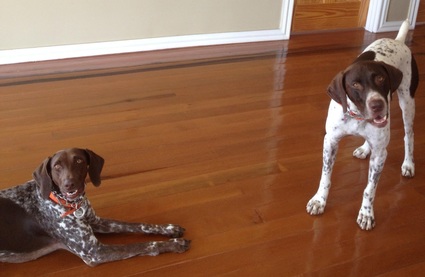|
Cody and Zoey love sleeping on our bed. However, we don't always love them sleeping on the bed, because Cody kicks, and Zoey insists on sleeping between me and Jeremy, making it impossible for us to cuddle. Luckily, as much as they would rather be on the bed with us, the dogs are usually willing to give up their spot on the bed and retire to their kennels in exchange for a small treat. In fact, they are more than willing. Zoey will race to a kennel at the site of a treat, sometimes a kennel Cody is already in. Rather than risk losing out on a treat, she will dive in with him, unperturbed, while Cody looks at me in panic, imagining a night crammed in his kennel with his younger, more energetic counterpart. After Zoey is hauled out and sent to her own kennel, and the dogs scarf down the chicken, cassava chip, or bit of peanut butter cookie I've scrounged from the kitchen, I wonder if my dogs are employing hyperbolic discounting when they trade their spot on the bed for a bit of food. Most people would rather have a reward now than the same reward later; we place higher value on getting the same reward sooner. This is called discounting, and it is perfectly rational. The higher the premium we place on getting things sooner, the higher our "discount rate". Economists often assume that people's discount rates are the same for waits that occur tomorrow, and waits that occur in the more distant future. For example, if I would prefer to have $100 today than $110 tomorrow, I should also prefer to have $100 in a year than $110 in a year and a day. But in real life, it often doesn't work that way. Many people would prefer to have $100 today, but they are willing to wait a day for $110 if that wait will happen a year from now. This inconsistency in the discount rate, depending on how far in the future the wait will be, is often described using a model called hyperbolic discounting. Normally, we don't think hyperbolic discounting is a great thing. It can lead to saving too little, and makes people vulnerable to scams like predatory lending. However, it is a very natural thing. It's typical among people, and has been observed in other primates, rats and pigs. (Weirdly, guppies engage in spacial discounting, choosing small food rewards over larger food rewards if the small food reward are closer, but they seem to have a linear discount function, suggesting they care more about the difference in distance when the reward is far away.) I couldn't find any papers on hyperbolic discounting in dogs. At first, I thought maybe this was because dogs just always eat their $100 treat right away, and studying a discount rate that is always infinity is utterly uninteresting. However, I was wrong: I did find a study showing that dogs will choose a smaller treat when they know they will be rewarded for it, indicating they do have some sense of delayed gratification. So when I offer Cody and Zoey a treat if they get off the bed and go to their kennels, am I the equivalent of a payday lender offering a loan for a flashy new TV at exorbitant interest rates? Do Cody and Zoey sit in their kennels, thinking that that tidbit of cheese totally wasn't worth giving up the chance to curl up by my head and fart on my face all night? It's possible they do, but I snuggle up next to Jeremy in my relatively hair-free bed, and then assuage my conscience by telling myself I will take them for a walk tomorrow.
0 Comments
Leave a Reply. |
About Liz
I have worked in economic policy and research in Washington, D.C. and Ghana. My husband and I recently moved to Guyana, where I am working for the Ministry of Finance. I like riding motorcycle, outdoor sports, foreign currencies, capybaras, and having opinions. Archives
December 2016
Categories
All
|

 RSS Feed
RSS Feed
